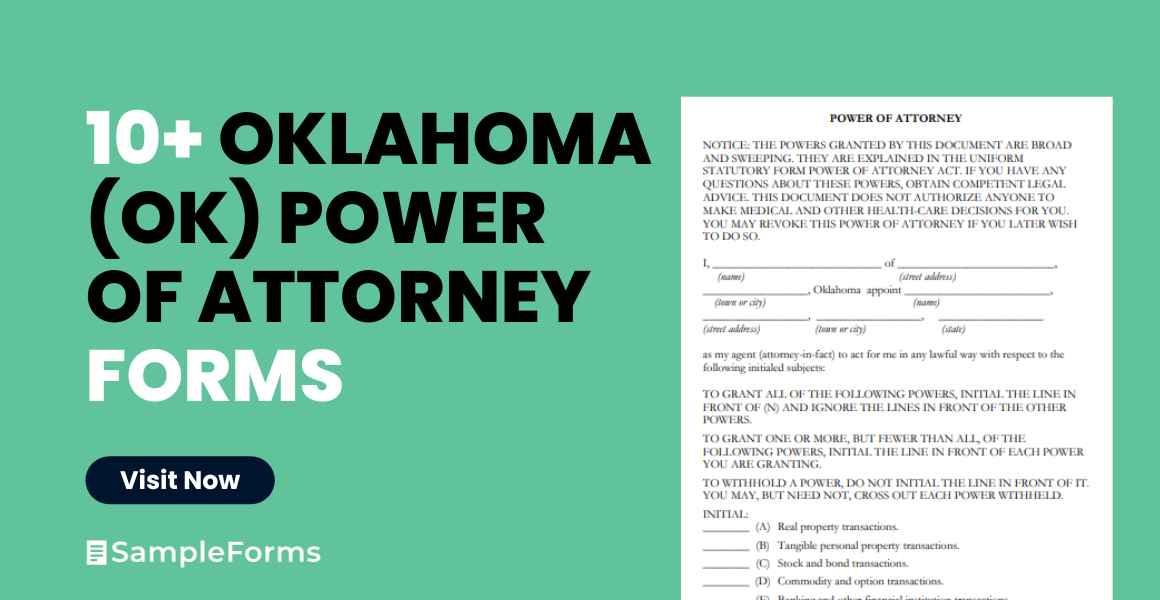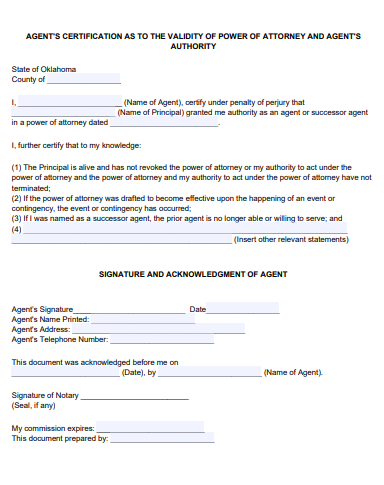Unlock the potential of Oklahoma Power of Attorney (POA) Forms with our insightful guide. Tailored for Oklahoma residents, this resource demystifies the process of delegating authority, covering everything from financial and healthcare decisions to personal affairs management. Our guide offers key tips and straightforward instructions, ensuring your POA aligns with Oklahoma laws and your specific needs. Ideal for those seeking to confidently manage their or a loved one’s affairs with legal precision and ease.
What is the Oklahoma Power of Attorney Form?
The Oklahoma Power of Attorney Form is a legal document that allows an individual, known as the principal, to appoint someone else, called the agent or attorney-in-fact, to make decisions and act on their behalf. This form is used in Oklahoma for various purposes, such as handling financial transactions, making healthcare decisions, or managing other personal matters, especially when the principal is unable to do so themselves. It’s a vital tool for legally authorizing someone else to manage your affairs.
What is the Best Sample Oklahoma Power of Attorney Form?
Creating a sample Oklahoma Power of Attorney (POA) form involves incorporating key elements to make it comprehensive and adaptable. However, it’s important to note that for actual legal use, consulting with a legal professional is advisable to ensure the form meets all legal requirements and is tailored to specific circumstances. Below is a basic structure for a sample Oklahoma POA form:
OKLAHOMA POWER OF ATTORNEY FORM
Principal’s Information:
- Name: [__________]
- Address: [__________]
- Phone Number: [__________]
Agent’s Information:
- Name: [__________]
- Address: [__________]
- Phone Number: [__________]
Powers Granted:
- Financial Decisions
- Real Estate Transactions
- Personal Property Management
- Healthcare Decisions
- Other: [Specify: __________]
Special Instructions:
[Provide any specific instructions or limitations on the agent’s power here.]
Effective Date:
- This Power of Attorney shall become effective on [Date: //____].
Duration:
- Durable (remains in effect even if I become incapacitated)
- Non-Durable (ends if I become incapacitated)
- Springing (becomes effective upon a specified event or condition)
Signature of Principal:
- Signature: [__________]
- Date: [//____]
Signature of Agent:
- Signature: [__________]
- Date: [//____]
Acknowledgment by Notary Public:
[Notary Public’s area for stamp and signature]
This sample form is designed to be fillable, allowing the principal to easily input their information and customize the powers granted to the agent. Remember, each situation is unique, and the form should be tailored to fit specific needs and legal requirements.
1. Oklahoma Standard Power of Attorney Form
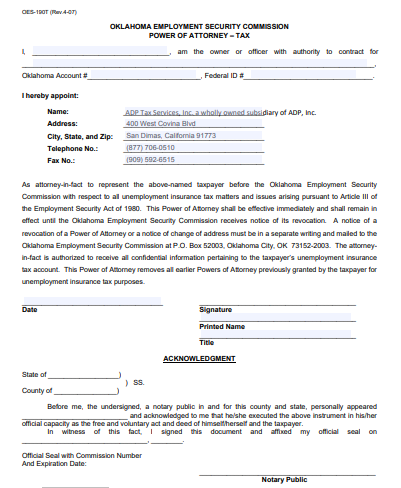
2. Oklahoma Special Power of Attorney Form
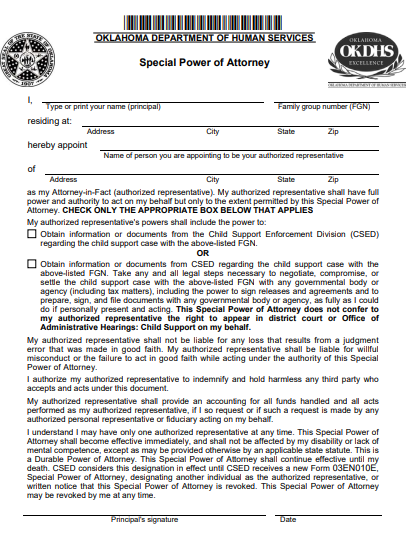
3. Oklahoma Simple Power of Attorney Form
4. Oklahoma Power of Attorney Form
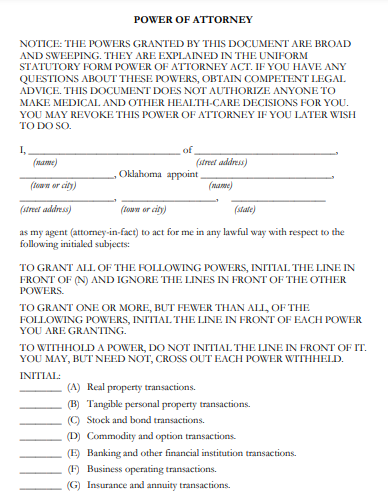
5. Oklahoma Minor Child Power of Attorney Form
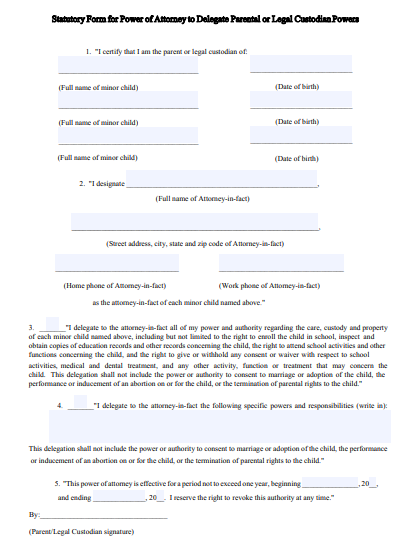
6. Oklahoma Medical Power of Attorney Form
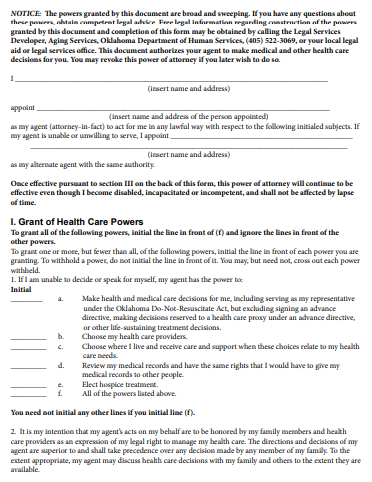
7. Oklahoma Limited Power of Attorney Form
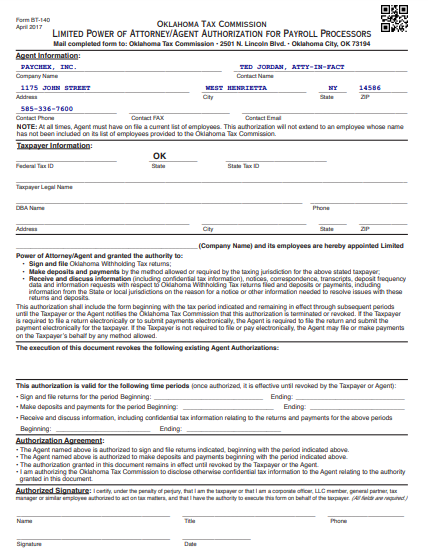
8. Oklahoma Health Care Power of Attorney Form
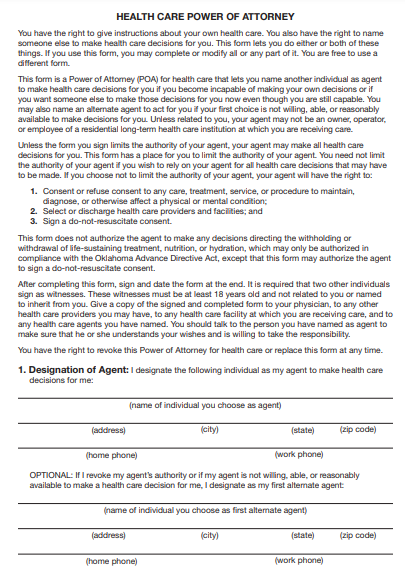
9. Oklahoma General Power of Attorney Form
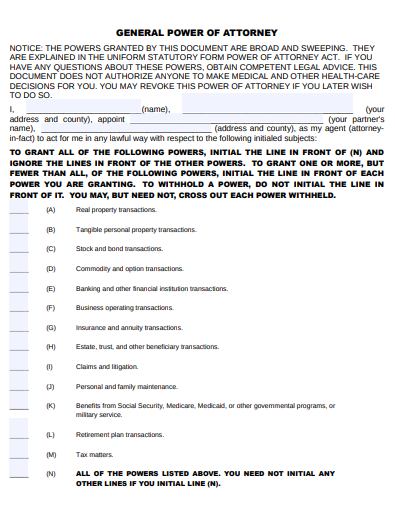
10. Oklahoma Durable Power of Attorney Form
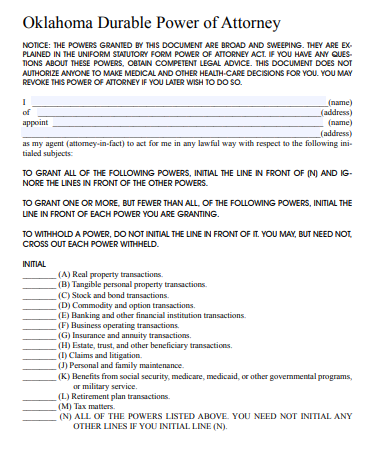
11. Oklahoma Blank Power of Attorney Form
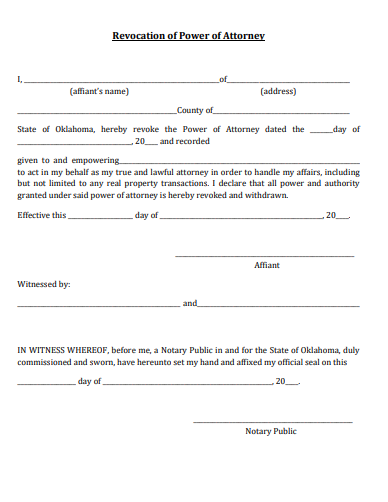
How Do You Get a Power of Attorney in Oklahoma?
Obtaining a Power of Attorney in Oklahoma involves selecting the appropriate form, filling it out accurately, and ensuring it meets legal requirements.
Examples:
1. Choosing the Right Form
Select a POA form that aligns with your needs, whether it’s for general, healthcare, or financial purposes.
2. Completing the Form
Accurately fill out the form with details of the principal and agent, ensuring clarity in the delegation of powers.
3. Understanding Legal Requirements
Ensure the POA adheres to Oklahoma’s legal standards, including state-specific clauses and provisions.
4. Notarization Process
Get the POA notarized in Oklahoma, as this is a critical step for legal validation.
5. Seeking Legal Advice
Consider consulting a legal professional, especially for complex situations or specific legal advice.
How Much Does It Cost to Get a Power of Attorney in Oklahoma?
The cost of obtaining a Power of Attorney in Oklahoma varies, depending on whether you draft it yourself or hire an attorney.
Examples:
1. Attorney Fees
Hiring a lawyer for a POA can offer expertise but may increase the overall cost.
2. DIY Forms
Utilizing online templates or forms can be a cost-effective alternative, though less personalized.
3. Notary Fees
Factor in the cost of notarization, which is essential for the POA’s legal validity in Oklahoma.
4. Additional Costs
Consider potential additional costs, such as document preparation or legal consultation fees.
5. Cost Comparison
Compare different options to find a balance between cost-effectiveness and legal thoroughness.
What is the Power of Attorney Form for Oklahoma Taxes?
The Oklahoma Tax Power of Attorney form allows an agent to handle tax matters on behalf of the principal.
Examples:
1. Filing Taxes
Authorizing an agent to file state taxes
2. Handling Audits
Representation during tax audits
3. Tax Disputes
Managing disputes with tax authorities
4. Information Access
Granting access to tax records.
5. Tax Decisions
Making decisions about tax issues
What is a Limited Power of Attorney Form in Oklahoma?
A Limited Power of Attorney in Oklahoma grants an agent specific, restricted powers for particular tasks or timeframes.
Examples:
1. Real Estate Transactions
Authority for a single property deal.
2. Financial Operations
Limited to specific financial tasks.
3. Healthcare Decisions
For a particular medical procedure.
4. Business Affairs
Handling specific business-related matters.
5. Temporary Authority
Valid for a set period.
Does a Power of Attorney Need to be Filed in Oklahoma?
In Oklahoma, filing a Power of Attorney is not generally required unless it pertains to real estate transactions.
Examples:
1. Real Estate POAs
Must be filed with the county clerk.
2. Healthcare POAs
No filing requirement.
3. Financial POAs
Typically not filed.
4. Legal Validity
Filing can enhance enforceability.
5. Public Record
Filing makes the POA a public document.
Does a POA Have to be Notarized in Oklahoma?
Yes, in Oklahoma, a Power of Attorney must be notarized to ensure its legal validity and acceptance by institutions.
Examples:
1. Legal Authentication
Notarization confirms the principal’s signature.
2. Fraud Prevention
Helps prevent fraudulent POA creation.
3. State Requirement
Aligns with Oklahoma legal mandates.
4. Document Integrity
Enhances the POA’s credibility.
5. Third-Party Acceptance
Ensures institutions recognize the POA.
What is the Difference Between Guardianship and Power of Attorney in Oklahoma?
| Aspect | Guardianship | Power of Attorney |
|---|---|---|
| Authority | Court-appointed, broad authority over personal and financial matters. | Granted by an individual, specific to the powers outlined in the document. |
| Duration | Generally long-term, until the court deems it unnecessary. | As specified in the document, can be durable or non-durable. |
| Control | Guardian has control over most aspects of the ward’s life. | Agent has control only over aspects specified in the POA. |
| Legal Process | Involves a legal process and court approval. | Created without court involvement, but must be legally compliant. |
| Revocation | Can only be revoked or altered by the court. | Can be revoked by the principal if they are mentally competent. |
This table outlines the key differences between guardianship and power of attorney in Oklahoma, highlighting the scope of authority, duration, control, legal process, and revocation terms.
How to Prepare an Oklahoma Power of Attorney Form
Preparing an Oklahoma Power of Attorney (POA) form is a critical process that requires attention to detail and an understanding of legal requirements. Here’s a step-by-step guide to ensure your POA is effective and compliant with Oklahoma laws.
Step 1 : Understanding Different Types of POA
First, understand the different types of POA available, such as General, Durable, Healthcare, or Limited POA. Each serves a specific purpose.
Step 2 : Selecting the Right Agent
Choose a trustworthy individual who understands your needs and is capable of making decisions in your best interest.
Step 3 : Drafting the POA Form
Use a standard Oklahoma POA form or create a custom one. Include essential details like your name, the agent’s name, and the specific powers granted.
Step 4 : Defining the Powers Clearly
Specify the exact powers you are delegating, whether they are financial, medical, or pertaining to real estate.
Step 5 : Including a Durability Clause
If you want the POA to remain in effect if you become incapacitated, include a durability clause.
Step 6 : Signing and Notarizing the Document
In Oklahoma, your POA must be signed in the presence of a notary public to be legally valid.
Step 7 : Storing the Document Safely
Keep the original document in a secure place and provide copies to your agent and relevant institutions.
Step 8 : Reviewing and Updating Regularly
Circumstances change, so it’s important to review and update your POA as needed.
Tips for Using an Effective Oklahoma Power of Attorney Form
To ensure your Oklahoma POA is used effectively, consider these tips:
1. Clear Communication
Discuss the POA with your agent to ensure they understand their responsibilities and your expectations.
2. Limiting Powers as Necessary
Grant only the powers that are necessary for your agent to carry out their duties effectively.
3. Monitoring the Agent’s Actions
Keep track of the decisions and actions taken by your agent.
4. Understanding Revocation Process
Know how to revoke the POA if needed, and inform your agent and relevant parties about the revocation.
5. Legal Compliance
Ensure that the POA complies with current Oklahoma laws and regulations.
6. Seeking Professional Advice
Consult with a legal professional for complex situations or if you have specific legal questions.
7. Informing Relevant Parties
Make sure that financial institutions, healthcare providers, and others who may be affected by the POA are informed about its existence and terms.
By following these steps and tips, you can create and use an Oklahoma Power of Attorney form that effectively communicates your wishes and ensures your affairs are managed according to your specifications.
Can Power of Attorney Argue in Court?
A Power of Attorney cannot represent the principal in court proceedings. Their role is limited to decision-making in areas specified in the POA document, not legal representation.
What Are the Limitations of a Power of Attorney?
A Power of Attorney cannot make decisions after the principal’s death, change the principal’s will, or act outside the authority granted in the POA document.
What Is the New Rules of Power of Attorney?
Recent changes in Power of Attorney laws focus on enhanced protections against abuse, clearer definitions of authority, and stricter requirements for documentation and witnessing.
Can a Power of Attorney Be Revoked in Oklahoma?
Yes, in Oklahoma, a Power of Attorney can be revoked by the principal at any time, as long as they are mentally competent, through a written notice.
Can You Have More Than One Power of Attorney in Oklahoma?
In Oklahoma, it’s possible to have multiple Power of Attorneys, each with different scopes and agents, to manage various aspects of the principal’s affairs.
Who Can Override a Power of Attorney in Oklahoma?
A Power of Attorney in Oklahoma can be overridden by a court order, especially in cases where the agent is acting improperly or against the principal’s best interests.
This comprehensive guide on Oklahoma Power of Attorney forms offers essential insights for creating and utilizing a POA effectively. It emphasizes the importance of understanding the types, selecting the right agent, and ensuring legal compliance. Remember, a well-prepared POA is a crucial tool for managing your affairs with confidence, providing peace of mind and legal clarity in managing personal, financial, or health-related decisions.
Related Posts
-
10+ Free Nevada (NV) Power of Attorney Form Download – How to Create Guide, Tips
-
10+ Free Nebraska (NE) Power of Attorney Form Download – How to Create Guide, Tips
-
10+ Free Montana (MT) Power of Attorney Form Download – How to Create Guide, Tips
-
10+ Free Missouri (MO) Power of Attorney Form Download – How to Create Guide, Tips
-
10+ Free Minnesota (MN) Power of Attorney Form Download – How to Create Guide, Tips
-
10+ Free Mississippi (MS) Power of Attorney Form Download – How to Create Guide, Tips
-
10+ Free Massachusetts (MA) Power of Attorney Form Download – How to Create Guide, Tips
-
10+ Free Maryland (MD) Power of Attorney Form Download – How to Create Guide, Tips
-
10+ Free Maine (ME) Power of Attorney Form Download – How to Create Guide, Tips
-
10+ Free Louisiana (LA) Power of Attorney Form Download – How to Create Guide, Tips
-
10+ Free Kentucky (KY) Power of Attorney Form Download – How to Create Guide, Tips
-
10+ Free Kansas (KS) Power of Attorney Form Download – How to Create Guide, Tips
-
10+ Free Iowa (IA) Power of Attorney Form Download – How to Create Guide, Tips
-
10+ Free Indiana (IN) Power of Attorney Form Download – How to Create Guide, Tips
-
10+ Free Illinois (IL) Power of Attorney Form Download – How to Create Guide, Tips
